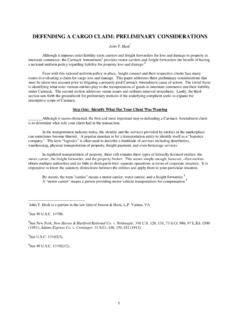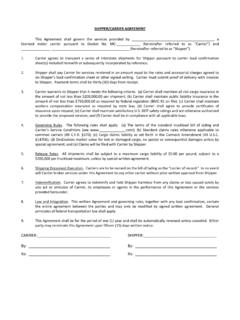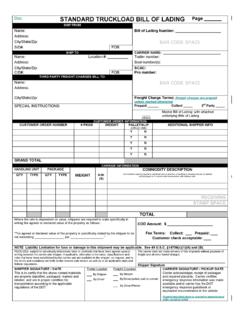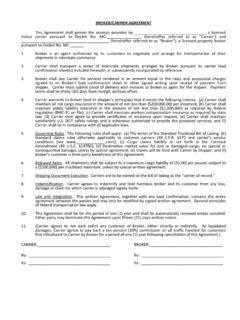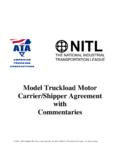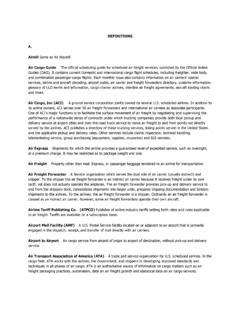Transcription of GETTING PAID FOR WAITING – ISSUES …
1 *John T. Husk is a partner in the law firm of Seaton & Husk, , Vienna, Citizen et al. v. Federal Motor carrier Safety Administration, 374 1209( Cir. 2004).2 See Detention of Motor Vehicles Nationwide; Ex Parte 124 680(1976); 126 803 (1977).3 See 46 17234, March 18, 132 906 (1982).1 GETTING paid FOR WAITING ISSUES REGARDING DETENTION CHARGES IN TODAY S TRUCKING INDUSTRYJohn T. Husk, Esq.* GETTING paid for detention is neither a recent or unique problem in the trucking industry. Although modeled after demurrage, detention has developed a character of its own in order tomeet the specific needs in the motor carrier industry. The basic purpose of detention is not toraise revenue, but rather to discourage undue delay of motor carrier equipment by shippers andconsignees. The focus on detention was spiked by the new hours of service regulations put in place by theFederal Motor carrier Safety Administration.
2 While these regulations are currently beingrevisited in light of the Court of Appeals for the District of Columbia's recent decision, theyremain in place at focus of this paper is to highlight some of the ways carriers through their applicable rulescirculars or contracts should address detention ISSUES in order to get History of DetentionIn 1973, the Interstate Commerce Commission instituted a rulemaking proceeding to developuniform detention rules for motor common carriers of property. After years of developing anextensive record, uniform detention rules were March 1981, the ICC issued a notice informing the public that it proposed to abolish theuniform detention rules to allow common carriers to establish their own non-discriminatory rulesthrough tariff After much comment, the ICC issued an Order eliminating theuniform rules and allowing all carriers to issue their own non-discriminatory detention rules intheir respective years have passed and the motor carriers are still tinkering with ways to reachworkable and reasonable business solutions with customers regarding accessorial chargesincluding 49 Can Carriers Protect Themselves To Get paid ?
3 The hours of service regulations sparked large and small carriers alike to deal with the detentionissue(s). If not previously addressed in an applicable rules circular or existing contract, manycarriers began contacting their customers to secure agreements regarding detention with powerand without power. The problem of detention consists of two distinct ISSUES detention of loaded trailers at theirdestination (destination detention), and detention of empty trailers at the origin of the shipments(origin detention). Different conditions surrounding the two types of detention require detention generally occurs due to factors attributable to the consignee. Assumingthat a carrier hauling a loaded trailer arrives at a reasonable time or a prearranged time, in theorythere should be no reason to delay unloading the trailer. Reasonable or prompt arrival is notalways the case, however.
4 In addition, a consignee may have inadequate unloading facilities,otherwise adequate facilities may be overburdened with unusual peak time arrivals, or in somecases they simply may be inefficient and thereby incapable of expeditiously unloading trailers. These factors and others combine to create detention of loaded trailers. The common thread isthat destination detention is primarily caused by difficulties encountered in the physicalunloading of the property and if these physical barriers were removed, then in theory nodetention would occur. It is well established in railroad law from which motor carrier is derived that a consigneebecomes liable for demurrage, the rail equivalent of detention, when a rail car is spotted aconsignee s location for unloading. Both the uniform bill of lading and the standard truckloadbill of lading used by motor carriers provide that the consignee will pay all lawful chargesaccruing on shipments.
5 This language tracks the federal statute establishing that the consignee isliable for additional rates and charges due after delivery unless it gives written notice beforedelivery that it is not the beneficial owner of the of the most prevalent ISSUES facing motor carriers today in terms of collecting detentioncharges is when the consignee is responsible for the delay on a prepaid shipment. A motorcarrier can bill a consignee for detention on prepaid shipments based on the carrier s rules oroperating circulars incorporated into the bill of lading by reference. A carrier s rules tariff canbe trumped and negated if a carrier has signed a contract that expressly supercedes the tariff,waives detention charges or otherwise precludes collection of detention from the consignee. While it is possible for a consignee to be liable for detention on prepaid shipments throughproperly drafted rules circulars and contracting practices, it is not enough in the truckloadmarketplace.
6 Consignors of collect shipments and consignees on prepaid shipments traditionallyhave not been held responsible for detention. It is prudent to notify the contracting shipper scustomer or vendor in advance that the carrier intends to hold it responsible for detention. Mostconsignors and consignees insist on appointments for pickups and deliveries. Sending6 Most carriers compute time by use and verification of a Qualcomm report, satellitecommunication or onboard tracking confirmations via fax or email that explain the carrier s expectations regarding liveloading or unloading, including references to free time, detention and the liability of the partyincurring the charges is prudent. Conversely, detention charges for loading present a significantly different set of element of certainty which characterizes unloading is replaced by uncertainty of the time inwhich a shipment is loaded and subsequently moved.
7 Carriers deal with ISSUES of spotting oftrailers for loading, computation of free time, free time of vehicles with power, and it is a rules circular or a contract, the application of free time, detention for vehicleswith power units and detention with vehicles without power units at destination and originshould be addressed. To follow are some examples of wording for contracts and/or tariffs thatcan be Time6 carrier shall allow [INSERT] of free time both for loading andunloading for vehicles with power units and drivers. carrier shall allow [INSERT] of free time both for loading andunloading of spotted trailers. Such time shall commence from thetime the trailer is spotted or from the time the trailer was requestedto be spotted, whichever is later, but Saturdays, Sundays orholidays shall not be included in the calculation of free Vehicles with Power UnitsWith respect to detention with power units, the following language should be considered in atariff or contract:(A)This item and/or section applies on shipments when thecarrier s vehicles with driver and power units are delayed ordetained beyond the free time provided for herein at time ofdelivery to the consignee or at time of pick-up at the consignor splace of business when such delay is not the fault of carrier .
8 (B)Charges for detention will be charged to the consignee inthe case of unloading and to the shipper in the case of loading.(C)When computing time, the beginning time shall be the timethe driver notifies the shipper or consignee of driver s arrival andthat the trailer is available for loading or unloading, as the case4may be, but in no case shall time commence prior to the time ofany appointment or the actual time of loading or unloading,whichever is first.(D)When computing detention charges, all non-working timeshall be excluded. Non-working time includes lunch breaks,coffee breaks and rest breaks.(E) If, at the end of the business day, unloading has not beencompleted and cannot be completed that day, the shipper orconsignee shall be given the following options:(1) carrier may return to carrier s terminal with whatfreight has not been unloaded, but carrier shall return thefollowing day with the balance of the freight at thecommencement of shipper s or consignee s work day; or,(2) carrier will spot trailer at shipper orconsignee location and return the following day,and further, trailer will be subject to charges fordetention without power pursuant to Item and/orSection ___ beginning immediately upon spottingof the trailer; and,(3) In either case, any unused free time from thefirst day will continue into the second day, chargesto commence when all free time has expired.
9 (F)If a vehicle is both unloaded and reloaded, each transactionwill be considered separately and free time shall apply to eachseparately.(G)When delay occurs beyond free time, the charge fordetention shall be $[INSERT] per hour or fraction thereof.(H) carrier shall give shipper or consignee the opportunity ofsigning the detention records and the shipper or consignee is tomake any corrections to these records at the time. If shipper orconsignee refuses to sign these records, carrier s records Vehicles Without Power UnitsWith respect to detention regarding vehicles without power units, the following language can beused:(A)This item or section applies when carrier spots a trailer atthe facilities of the shipper or consignee for the loading orunloading of shipments upon the request of shipper, but neitherthis item and/or section nor detention under any other term orcondition shall apply if the carrier spots the trailer for carrier sconvenience with or without the authorization of shipper orconsignee.
10 (B)Time shall commence with the spotting of the trailer andshall end when carrier is notified by the shipper or consignee thatthe trailer is available for removal from the premises of the shipperor consignee.(C)If a trailer is both unloaded and reloaded, an additional two(2) hours free time shall be allowed.(D)After expiration of free time as provided herein, charges fordelaying the trailer beyond free time shall be $[INSERT] per 24hour period or fraction thereof, plus a repositioning cost of$[INSERT].ConclusionMore so than ever, the old adage "time is money" has no truer meaning in the trucking industry. Making sure that motor carriers adequately protect themselves through contract or by rulescircular so that accessorial charges such as detention can be collected in the event of delay ispivotal. C:\Seaton&Husk\JTH\Articles\jth-tli
